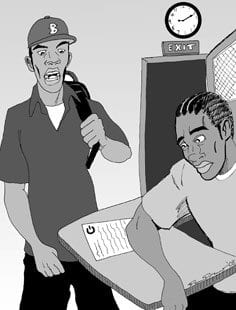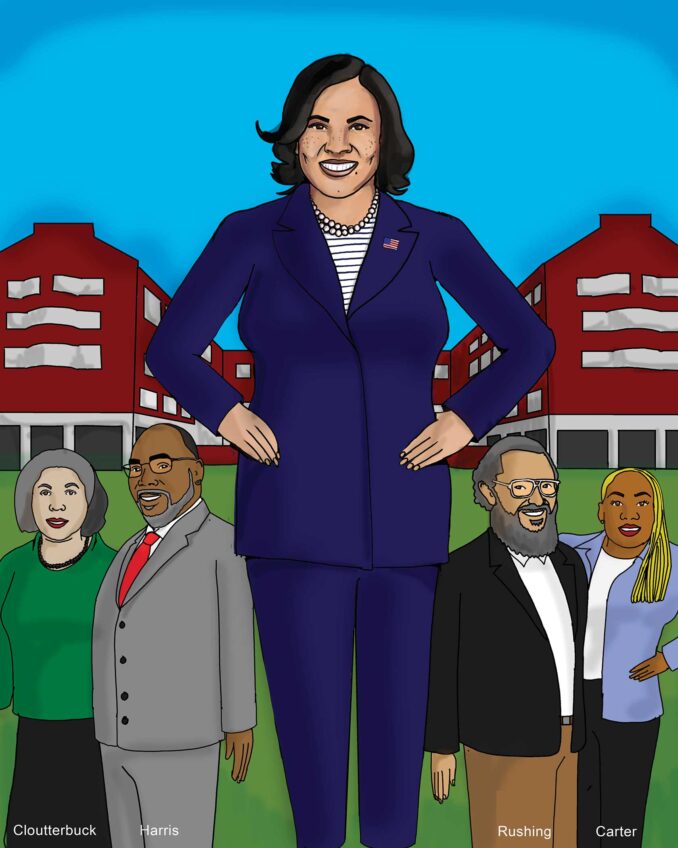
A return to old school values
|
|
“You gotta be a scholar-athlete.” |
Summer is over and school is in session. Students now have the responsibility to progress academically, and educators in the public schools have to meet the achievement standards of the federal No Child Left Behind law.
In this state, scores on the Massachusetts Comprehensive Assessment System (MCAS) tests determine whether those objectives are met. Unfortunately, the scores of black students indicate that a serious academic disparity exists in Boston. Only 40 percent of black Boston Public Schools (BPS) 10th-grade students scored advanced or proficient on the English Language Arts exam in 2007, compared with 74 percent of whites and 76 percent of Asians. On the 10th-grade mathematics test, 45 percent of blacks scored advanced or proficient, compared with 74 percent of white students and 89 percent of Asians.
There is considerable debate about the reason for this disparity. Some argue that the MCAS tests are biased. Others insist that the school curriculum is not designed to engage the attention of black students. Still others are generally critical of the school system. The fact remains, however, that while black students are underperforming, Asian and white students are scoring higher, posting better high school graduation rates and being accepted at elite universities in greater numbers.
In upscale suburbs, there is a general expectation that students will graduate from high school and go on to college. Parents tend to push their children toward that goal. There is not always similar intensity in lower-income black urban communities. While many parents are actively involved in the academic achievement of their children, the community’s once-high regard for scholastic pursuits has waned.
Sixty years ago, there were few opportunities for blacks in professional sports. Most roles in Hollywood films and the emerging medium of television were demeaning. Upward mobility for African Americans was essentially limited to the professions. Doctors, lawyers, teachers and preachers were the stars of the community. It was well understood that academic achievement was necessary to gain one of those respected positions.
Such enthusiasm and respect for academic achievement has abated in much of the black community. There is less belief that education is the road to progress. African Americans must revive their confidence in the value of educational success so that the whole community will inspire the young to develop their talents and eliminate the racial disparity in education.
It’s the people’s money
President George W. Bush and conservatives in Congress have consistently opposed more regulation for the financial industry. The unwise reliance on the self-policing capacity of the marketplace has resulted in the crisis confronting the nation. The proposed solution is for taxpayers to underwrite the cost of Wall Street’s greed.
The U.S. Treasury has already committed $314 billion to bail out investment firm Bear Stearns, mortgage loan giants Fannie Mae and Freddie Mac, and insurance corporation AIG. Treasury Secretary Henry Paulson now proposes the expenditure of an additional $700 billion to buy the subprime mortgages that are threatening to bankrupt American banks. However, any bailout involving public funds must have a direct benefit for taxpayers.
Before approving Paulson’s proposals, Democrats in the legislature must be assured that taxpayers receive an equity interest for buying mortgages at a depressed price and that worthy homeowners who defaulted on their mortgages have relief. There must also be assurances that executives of the distressed companies are not paid exorbitant salaries at the public’s expense.
It must be remembered that the Wall Street bailout will impair the capacity of the next president to put forth expensive plans to benefit the people. The financial interests of the people must not be ignored.






